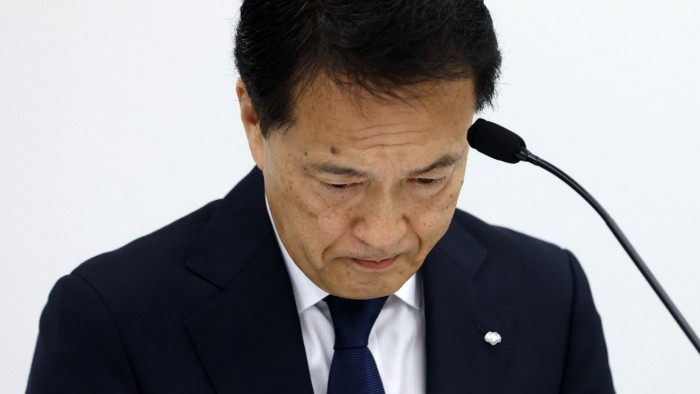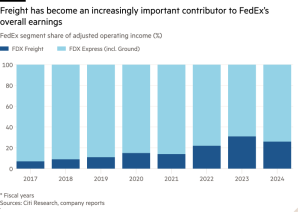Scandal of attempted murder shakes Nomura’s doorstep sales army

Deep at the heart of Nomura’s corporate culture is the legend of Yoshihisa Tabuchi: the hyper-driven salesman-turned-chief executive who led Japan’s biggest brokerage through the 1980s bubble and whose supremacy as a banker sent shockwaves through Wall Street.
Rookie Nomura salespeople, psyching themselves up for their first knock on a stranger’s door, are told of how in his early days Tabuchi would visit over 500 homes and wear out a pair of shoes each week plying his trade with absolute dedication.
But in late 2024, a threat to Nomura’s reputation as a dominant force on Japanese doorsteps has emerged from an alarming and unexpected direction. The company’s hard-won image is at risk of being overshadowed by a former Nomura wealth management employee in Hiroshima who was arrested last month and charged with attempting to murder his elderly clients, rob them and burn their house down.
Nomura has rushed to try to contain the fallout from the scandal. The bank’s president and chief executive, Kentaro Okuda, convened a special press conference last week where he bowed deeply in public apology, announced measures to try to restore confidence and cut his own pay in atonement.
The shocking actions of the Nomura salesman, who was dismissed from the bank and whose trial has not yet started, has horrified a nation. Japan has, over decades, grown comfortable with the idea of young, clean-cut financial salespeople from banks including Nomura, Daiwa Securities, SMBC Nikko and their many smaller competitors entering their homes and talking — often in considerable detail — about investments.
The Hiroshima scandal poses a risk to Nomura. Despite expanding to become a global investment bank, the wealth management division remains critical — bringing in close to 25 per cent of its ¥483.3bn revenues in the most recent quarter.
“Nomura takes this seriously because this incident has happened in a very, very important part of the business,” said Jesper Koll, an expert director at online brokerage Monex Group, which is also expanding sales staff in Japan even as it seeks to convert the nation to digital wealth management.
Apocryphal or not, the Tabuchi shoe-leather story remains powerful motivational fuel as Nomura’s modern-day and expanding sales army takes to the streets. Rebranded as wealth managers and financial advisers, they are fundamentally selling investment products the old-fashioned way in an era of online trading and chatbots.
“Outside Japan, the idea of door-to-door investment sales and the emphasis on face-to-face meetings with wealth managers may seem like a big anachronism,” said Koll.
“But it’s only an anachronism when you forget who most of this is aimed at: elderly Japanese who hold most of the wealth in Japan, and often are not comfortable on the phone, let alone on a PC.”
When the government undertook the gargantuan effort to sell the public on the $12bn privatisation of Japan Post in 2015, Nomura’s door-to-door sales staff and local branch wealth managers spearheaded the effort.
“Among the other sales staff, we were on a Line [social media] chat group at that time talking about the different experiences,” said a former Nomura employee who went door-to-door in wealthy residential districts of Tokyo during the Japan Post listing and other large share sales.
“One of the main discussions was what was the best throat spray, because after about three days, we were all hoarse, and how to avoid drinking too much tea in people’s houses,” he said.

Wealth management and retail broking is only set to become more important as the return of inflation in Japan is expected to encourage households to shift their savings into riskier assets. The government, the Tokyo Stock Exchange and financial regulators are trying to convince Japanese households to move more of their $13tn of savings from cash and deposits into higher yielding investments.
Earlier this year, the government doubled the annual contribution limits of the Nippon individual savings account (Nisa), a tax-free investment scheme, to ¥2.4mn to encourage retail investors to move their cash and savings into stocks, mutual funds and other products.
Nomura and other banks have worked to capitalise on the limit increase, with analysts estimating that ¥4.3tn had already been ploughed into stocks this year via Nisa by October.
But for all the house visits, which are common practice across industries in the country, Japanese households remain sceptical of stock markets. In 1949, individuals owned 69.1 per cent of the Tokyo stock market but by 2023, that had fallen to 16.9 per cent, according to data from CLSA, an institutional broker and investment group.
Japanese people do not want to invest in stocks as a result of the national trauma caused by the collapse of the 1980s bubble and the so-called lost decades that followed. More fundamentally, people did not see the need to bet on stocks when deflation allowed them to feel that their cash was not losing value.
“The sad, inescapable conclusion is that retail never acquired any semblance of trust or respect for the equity market,” said Nicholas Smith at CLSA.
Inflation could change that but savers have long memories and some estimates suggest that more than half of the financial assets of Japanese households are held by people over the age of 70.
Okuda — who has spent the majority of his career in investment banking — has expanded his own army of salespeople by 50 per cent over the past year to 4,800, according to the company.
Be it in branches or doing house visits, they are serving an increasingly different purpose than the generations that came before, targeting higher income customers and becoming more focused on financial planning and advice than the hard sell.
The hope for Okuda is that his apology will be enough to draw a line under this crisis and allow the bank to continue to build in that new direction — meaning there may never be another chief executive who wears out as many pairs of shoes as Tabuchi.
#Scandal #attempted #murder #shakes #Nomuras #doorstep #sales #army





